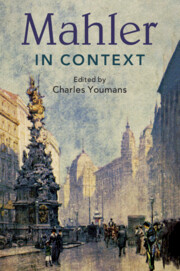Book contents
- Mahler in Context
- Composers in Context
- Mahler in Context
- Copyright page
- Dedication
- Contents
- Figures
- Music Examples
- Notes on Contributors
- Preface and Acknowledgments
- Abbreviations
- Part I Formation
- Part II Performance
- Part III Creation
- Part IV Mind, Body, Spirit
- Chapter 20 Organized Religion
- Chapter 21 German Idealism
- Chapter 22 Nietzsche
- Chapter 23 Fechner
- Chapter 24 Literary Enthusiasms
- Chapter 25 Romantic Relationships
- Chapter 26 Mahler and Death
- Part V Influence
- Further Reading
- Index
Chapter 24 - Literary Enthusiasms
from Part IV - Mind, Body, Spirit
Published online by Cambridge University Press: 18 December 2020
- Mahler in Context
- Composers in Context
- Mahler in Context
- Copyright page
- Dedication
- Contents
- Figures
- Music Examples
- Notes on Contributors
- Preface and Acknowledgments
- Abbreviations
- Part I Formation
- Part II Performance
- Part III Creation
- Part IV Mind, Body, Spirit
- Chapter 20 Organized Religion
- Chapter 21 German Idealism
- Chapter 22 Nietzsche
- Chapter 23 Fechner
- Chapter 24 Literary Enthusiasms
- Chapter 25 Romantic Relationships
- Chapter 26 Mahler and Death
- Part V Influence
- Further Reading
- Index
Summary
Given Mahler’s Bohemian-Moravian upbringing in a German linguistic enclave by a culturally aspirational bibliophile father, a gymnasium education in Iglau that was almost certainly orientated toward classical literature, and early friendships with a number of cultured figures, many of whom would go on to play distinguished professional roles within the Austrian intelligentsia (Guido Adler, Friedrich Löhr, Emil Freund, Josef Steiner, Anton Krisper, Albert Spiegler, and Siegfried Lipiner), it is unsurprising that Mahler’s life developed strongly intellectual dimensions and that in his early years he even toyed with the idea of pursuing a literary career. Those interests are reviewed here, in sections on texts that he set musically (principally the poetry of Des Knaben Wunderhorn, Friedrich Rücket, and Hans Bethge) and personal literary interests (above all, Goethe, Schiller, Shakespeare, Tolstoy, and Dostoyevsky). From this selection certain general features of Mahler’s literary taste can be gleaned, confirming the basic conservatism remarked by Alma.
- Type
- Chapter
- Information
- Mahler in Context , pp. 207 - 215Publisher: Cambridge University PressPrint publication year: 2020

